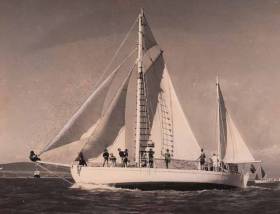Displaying items by tag: Tim Magennis
Tim Magennis, the doyen of the traditional and classic boat movement on Ireland’s east coast, and one of the main movers in many significant historic sailing events in Ireland and the Irish Sea, was acclaimed with elevation to Honorary Life Membership of the internationally-represented Old Gaffers Association at its Annual General Meeting in London at the weekend writes W M Nixon.
It was a significant annual occasion from which the Dublin Bay Old Gaffers Association has returned with three major awards. Led by President John Wedick with Honorary Secretary Mark Sweetnam masterfully presenting the DBOGA case, the Irish contingent came back with Honorary Life Membership for Tim Magennis, plus the Cape Horn Trophy for Seamanship which went to Darryl Hughes for his already and deservedly widely-honoured Round Ireland Race with the gaff-rigged 81-year old ketch Maybird, and the “Grumpy Two” Cups, which went to DBOGA member Paddy Murphy of Renvyle in Galway, and his 16-year-old grandson Conor.
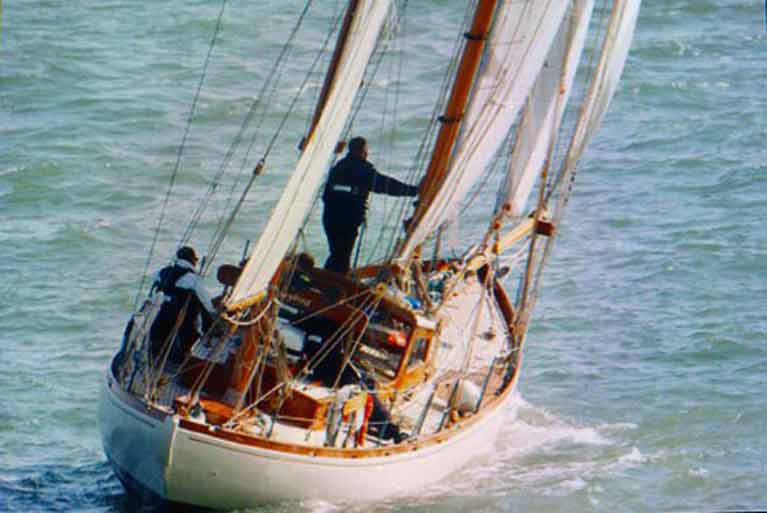 Darryl Hughes’ restored 1937 Tyrrell of Arklow ketch Maybird has received many awards for her completion of the 2018 Round Ireland Race from Wicklow, and now she can add the Old Gaffers Association Cape Horn Trophy to her collection
Darryl Hughes’ restored 1937 Tyrrell of Arklow ketch Maybird has received many awards for her completion of the 2018 Round Ireland Race from Wicklow, and now she can add the Old Gaffers Association Cape Horn Trophy to her collection
The “Grumpy Two” Cups are for a successful gaff-rigged venture by a senior skipper and a junior crew, and Paddy and Conor were awarded for their success in completing a round Ireland cruise with the restored 1916 Manxy Nobby Aigh Vie. This was a circuit which eventually brought Aigh Vie from the Connemara coast southabout of Ireland to her birthplace of Peel in the Isle of Man in time for the Peel Traditional Boat Festival, then northabout back to the Atlantic and Connemara. It was a major challenge, yet having met them during their circuit cruise, I can assure you that far from being grumpy, Paddy and Conor were notably cheerful in getting on with the task they’d set themselves.
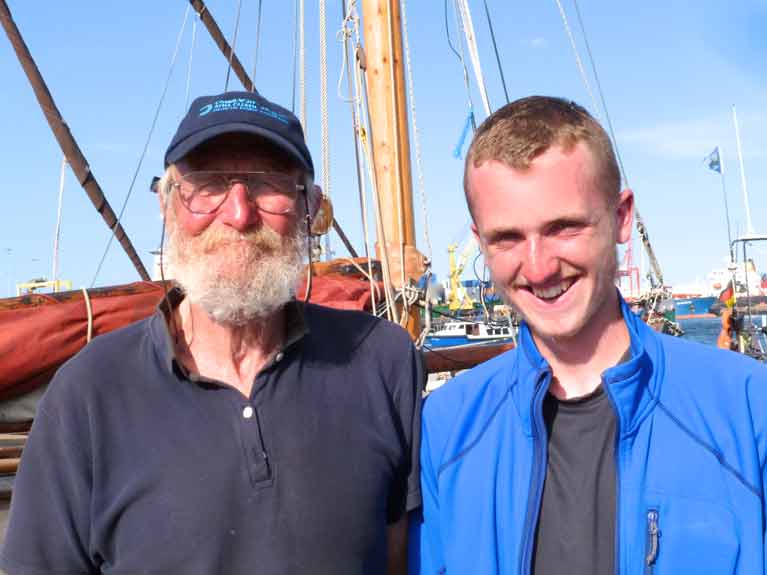 Paddy Murphy and his grandson Conor – notably cheerful winners of the “Grumpy 2” Cups. Photo: W M Nixo
Paddy Murphy and his grandson Conor – notably cheerful winners of the “Grumpy 2” Cups. Photo: W M Nixo
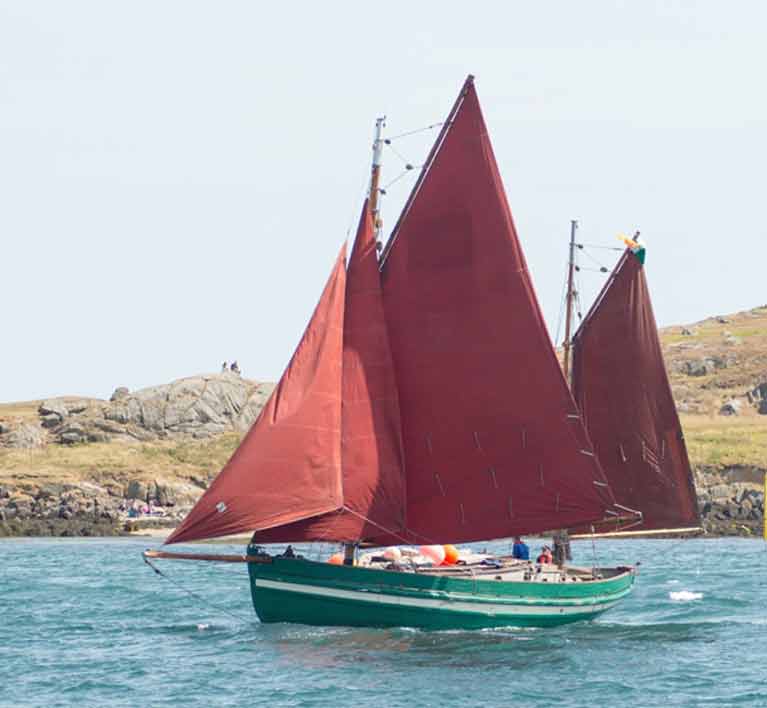 On her way to her birthplace in the Isle of Man….the newly-restored Aigh Vie coming into Dublin Bay through Dalkey Sound. Photo: Gill Mills
On her way to her birthplace in the Isle of Man….the newly-restored Aigh Vie coming into Dublin Bay through Dalkey Sound. Photo: Gill Mills
What they were doing was particularly appreciated by Tim Magennis, as he had known Aigh Vie as a fishing boat during his childhood. In fact, he is uniquely qualified to have fulfilled his many roles involving traditional rig and classic boats, as he is one of the few people who has actually sailed round the world under gaff rig. He did so as a crew-member on the classic Colin Archer ketch Sandefjord in 1965-67, and this remarkable sea story was featured on Afloat.ie on 20th April 2013 when Tim was President of the Dublin Bay Old Gaffers Association, of which he'd been a founding member in the late 1980s.
2013 saw the celebration of the OGA’s Golden Jubilee with an international OGA rolling circuit cruise round Britain that came west to Dublin Bay for a series of combined and successful events which became the highlight of the year’s celebrations. Tim Magennis was central to all the organisation based on Poolbeg Y&BC in Dublin Port, and in particular, he was the prime mover in the inaugural staging of the DBOGA Leinster Trophy Race, which brought together a superb fleet of classic and traditional craft from six different countries.
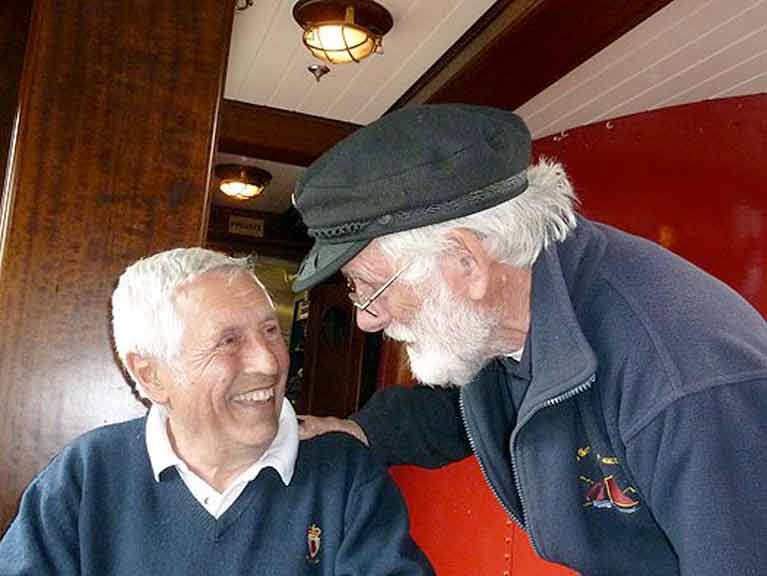 Dickie Gomes, owner of the 1912-built Ainmara which was the first winner of the Leinster Trophy in 2013, with Tim Magennis, at that time President of Dublin Bay OGA. Photo: W M Nixon
Dickie Gomes, owner of the 1912-built Ainmara which was the first winner of the Leinster Trophy in 2013, with Tim Magennis, at that time President of Dublin Bay OGA. Photo: W M Nixon
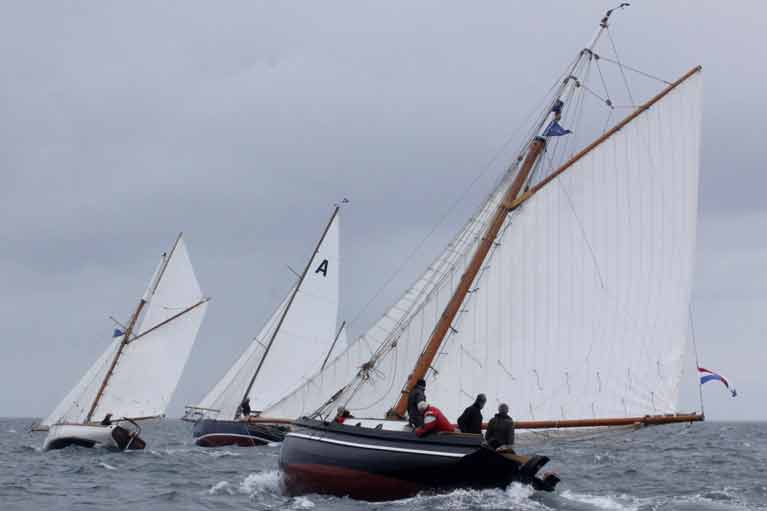 International competition in the first Leinster Trophy Race in 2013, with the Dutch-owned Raven (left) and Cinemara (also from The Netherland, right) with eventual winner Ainmara fom Strangford Lough between them. Photo: Dave Owens
International competition in the first Leinster Trophy Race in 2013, with the Dutch-owned Raven (left) and Cinemara (also from The Netherland, right) with eventual winner Ainmara fom Strangford Lough between them. Photo: Dave Owens
Having spent his childhood in the fishing port of Ardglass on the County Down coast, Tim had in boyhood frequently been aboard such famous Irish Sea fishing boats with Isle of Man connections as Vervine Blossom and White Heather in addition to Aigh Vie. Thus it was a particular pleasure to him that in July 2018 Aigh Vie reappeared fully restored, sailing into Dublin Bay from Ireland’s West Coast and on her way to success, though not until after the weather had severely tested Paddy Murphy’s work.
Tim Magennis’s own early life-path had been adventurous as an international journalist working mainly in Africa, which meant that the circumnavigation in Sandefjord with the brothers Pat and Sean Cullen started and finished at Durban in South Africa.
But with the Sandefjord voyage completed, he was soon to return to Ireland and settle in Dublin where, after another period in journalism, he created a unique niche to which he was particularly suited. This was working in Public Relations for Bord Failte (the Irish Tourist Board) in the exciting days when today’s Irish hospitality industry was finding its feet, and Tim was frequently its very effective voice.
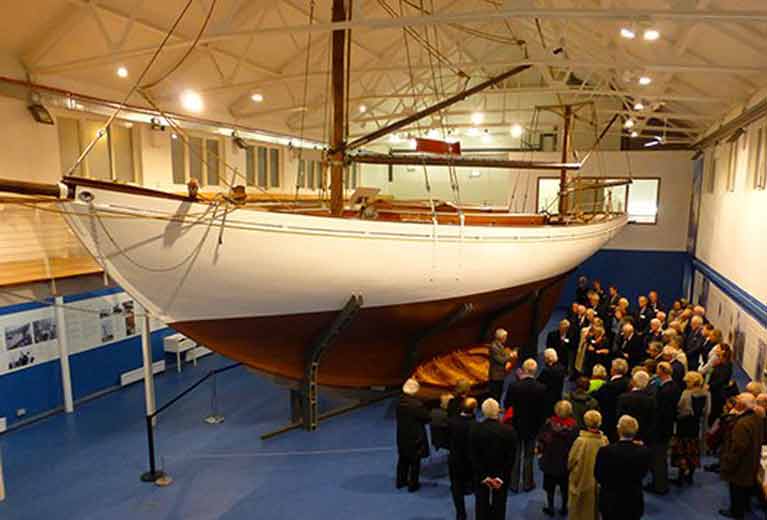 The conserved Asgard on display in Collins Barracks Museum – Tim Magennis played a leading role in ensuring that this historic ketch received the attention she deserved. Photo: W M Nixon
The conserved Asgard on display in Collins Barracks Museum – Tim Magennis played a leading role in ensuring that this historic ketch received the attention she deserved. Photo: W M Nixon
This enabled him to refresh his involvement with Irish seafaring and traditional craft, and he was one of those who ensured that Erskine Childers’ historic 1905 ketch Asgard never faded from public memory, such that in due course a full programme was put in place which has resulted in Asgard being conserved to the highest standards by expert shipwright John Kearon, and put on permanent public display in Collins Barracks Museum in Dublin.
In addition to such national projects, Tim himself was acutely aware of the need for individual private effort to save our traditional and classic craft, and on his retirement he took on the restoration of the 25ft 1896-built gaff sloop Marguerite, designed by Herbert Boyd (who later created the Howth 17s) and built in 1896 by Jack Wellington of Malahide.
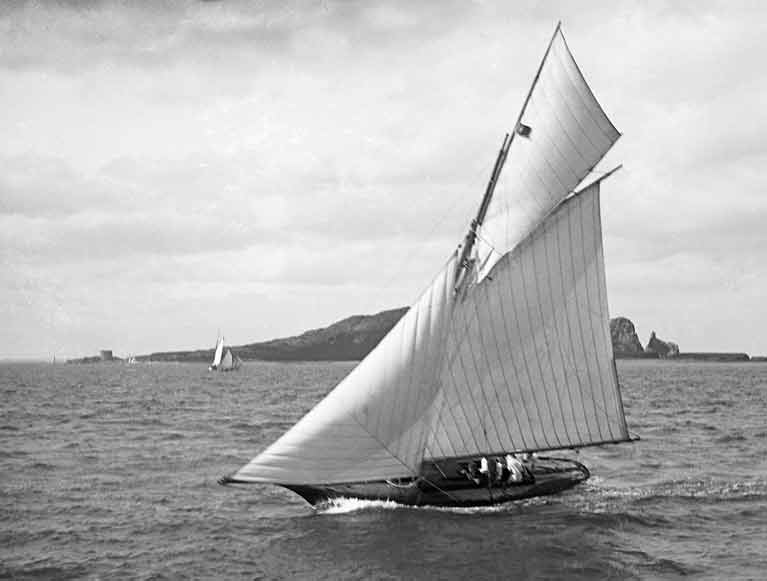 The new 1896-built Marguerite sailing in Howth Sound in the 1890s. Tim Magennis restored her in the 1980s, and has since ensured her future with “Transference of Custodianship” to Guy Kilroy, who is upgrading this historic craft to international classic standards. Photo courtesy HYC
The new 1896-built Marguerite sailing in Howth Sound in the 1890s. Tim Magennis restored her in the 1980s, and has since ensured her future with “Transference of Custodianship” to Guy Kilroy, who is upgrading this historic craft to international classic standards. Photo courtesy HYC
For very many years, Margurite was Tim’s pet boat, a familiar site sitting elegantly on her mooring in Dun Laoghaire’s inner harbour off the DMYC, and a regular participant in DBOGA events. But with advancing years (he turned 90 back in November), Tim reckoned that he had to ensure that Margurite’s future was secure, and in 2017 he “transferred the custodianship” to Dun Laoghaire-based classic boat enthusiast Guy Kilroy, who has commissioned an up-grading of Marguerite to international standards by noted Fingal-based boatbuilder Larry Archer, a meticulous project which will be completed this year.
The London OGA gathering celebrated such projects, large and small, which are underway all over the world. And for the Dublin contingent with their three major awards, it was a very special gathering indeed. But undoubtedly the highlight was Honorary Life Membership for Tim Magennis, a great and engaging character whose infectious enthusiasm, zest for life, delight in traditional rigs, and joy in sailing the sea continues to be an inspiration for the many who know him
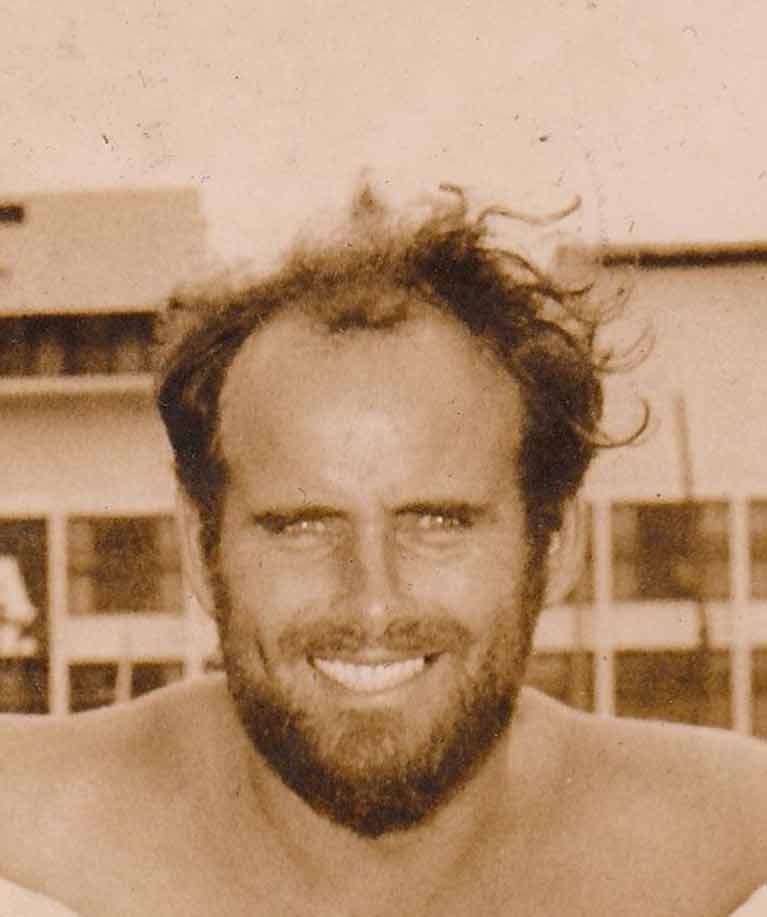 An inspiration to all…..Tim Magennis, now an Honorary Life Member of the Old Gaffers Association, in his younger days during Sandefjord’s round the world cruise in 1965-67
An inspiration to all…..Tim Magennis, now an Honorary Life Member of the Old Gaffers Association, in his younger days during Sandefjord’s round the world cruise in 1965-67
The Dublin Bay Old Gaffers Association (DBOG) Winter /Spring lecture programme continues in the Poolbeg Yacht Boat Club & Marina (PYBC). with the next lecture: "The Installation, Operation and Maintenance of Marine Diesels". The lecture will be held on Tuesday, February 8th and the presenter is Sean Walsh (Yanmar Agent).
For further information on the DBOG lectures please contact Tim Magennis on 087 2593113. For information in general about the PYBC Tel: (01) 668 9983 or logon to www.poolbegmarina.ie/
Lecture: "Childers and the Asgard"
The Dublin Bay Old Gaffers Association (DBOG) are holding their annual Winter /Spring lecture programme in the Poolbeg Yacht Boat Club & Marina (PYBC). The first lecture in 2011 is "Childers and the Asgard - The Enduring Enigma" by Tim Magennis and is to be held on Tuesday 11 January.
The talks proper will begin at 8 pm but the organisers are encouraging those wishing to attend to assemble at 7.15 pm for a socialable drink in advance of the talk starting.
The Poolbeg clubhouse is located on the South Bank, Pigeon House Road, Ringsend which can be accessed from the Sean Moore Road that connects the Merrion Strand Road (from the south) and the East-Link Toll Bridge (from the north).
For further information on the DBOG lectures please contact Tim Magennis on 087 2593113. For information in general about the PYBC Tel: (01) 668 9983 or logon to www.poolbegmarina.ie/
Lecture: "Pilots in the Bristol Channel"
in the Poolbeg Yacht Boat Club & Marina (PYBC). The next lecture is "Pilots in the Bristol Channel" by
Tom Cunliffe which is to held on Tuesday 23 November (1930 for 2000 hrs start).
the Sean Moore Road that connects the Merrion Strand Road (southbound) and the East-Link Toll Bridge
(northbound).
For further information on the DBOG lectures contact Tim Magennis on 087 2593113.
and on the PYBC Tel: (01) 668 9983 or logon to www.poolbegmarina.ie/
Lecture: "The Newfoundland Cruise"
in the Poolbeg Yacht Boat Club & Marina (PYBC). The next lecture is "The Newfoundland Cruise" by
Paddy Barry which is to held on Tuesday 2 November (1930 for 2000 hrs start).
For further information on the winter lecture series, contact Tim Magennis 087 2593113 For general information on the PYBC Tel: (01) 668 9983 or logon to www.poolbegmarina.ie/



























